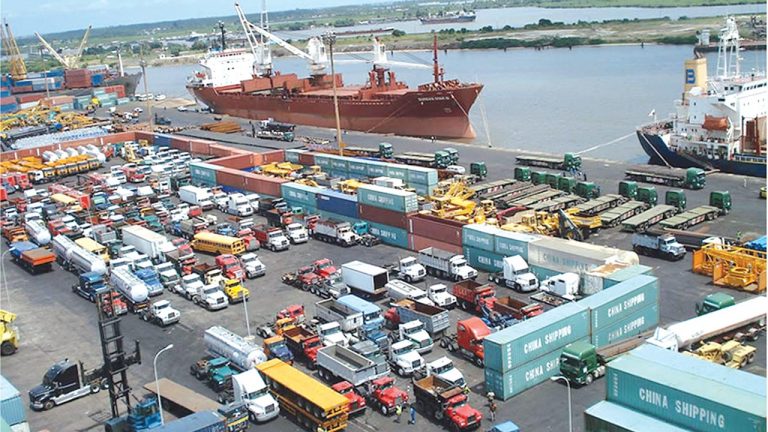
The Federal Government has approved the dredging of the Lekki Deep Seaport, a move aimed at boosting Nigeria’s maritime capacity and positioning the country to benefit from larger transshipment volumes across West Africa.
Managing Director of the Nigerian Ports Authority (NPA), Dr. Abubakar Dantsoho, announced the approval during an official visit to the facility over the weekend. According to Dantsoho, the federal government will deepen the port channel from its current 16.5 meters to 17 meters, with a long-term ambition of reaching 19 meters. The project will be executed in partnership with China Harbour Engineering Company (CHEC), following a series of consultations with stakeholders.
“The rise in throughput volume at Lekki Port is exciting to us,” Dantsoho said. “Lekki’s capacity to berth super post-Panamax vessels and deliver rapid cargo and vessel turnaround positions it as a game-changer for Nigeria’s export competitiveness, particularly for agro-allied products.”
Register for Tekedia Mini-MBA edition 19 (Feb 9 – May 2, 2026).
Register for Tekedia AI in Business Masterclass.
Join Tekedia Capital Syndicate and co-invest in great global startups.
Register for Tekedia AI Lab.
He added that the Lekki Port’s distinctive features, including full automation and integrated cargo handling systems, will strengthen the country’s position under the African Continental Free Trade Area (AfCFTA). Dantsoho also revealed that the NPA had awarded a contract for a hydrographic survey of the channel, a prerequisite for the port’s navigation compliance with international maritime standards.
Since its commercial operations began in April 2023, the Lekki Deep Seaport, Nigeria’s largest, has been promoted as a transformative project. Designed to handle 6 million TEUs annually, the port is envisioned to reduce cargo pressure on Lagos’s overstretched Apapa and Tin Can ports. But for many industry observers, simply expanding Lekki does not solve the country’s deeper infrastructural imbalance.
Lagos-Centric Model Under Fire
But while the Nigerian Ports Authority (NPA) touts the approval as a milestone for economic competitiveness, the development has also reignited longstanding calls for the decentralization of Nigeria’s port infrastructure. This is a debate that continues to expose deep-rooted concerns about regional economic exclusion and Lagos-centric planning.
Economist Kelvin Emmanuel, in a note, said the persistent congestion in Lagos is a symptom of poor strategic planning and political manipulation of port development across the country.
“The congestion in [Lagos] cannot be solved until the government gets serious about allowing all the ports to operate freely,” Emmanuel said.
He noted that Nigeria’s eastern maritime corridor — home to ports like Onne, Calabar, Warri, and the long-stalled Ibaka Deep Sea Port in Akwa Ibom — has been neglected for years, even as Lagos’s logistical infrastructure continues to choke under rising cargo volumes.
“Lies they tell Nigerians that Lagos is the best place to site port operations in Nigeria. And that all commerce starts and ends in Lagos — wicked lies! If you don’t diversify port operations to the eastern maritime corridor and build vertically integrated standard gauge rail lines, you’ll not see inclusive growth,” Emmanuel added.
According to him, the dysfunctional state of port infrastructure outside Lagos is not accidental.
“I have made my findings and it’s Abuja that is holding the Ibaka Deep Sea Port in Akwa Ibom from moving forward,” he said. “You cannot claim to be progressive and restrict maritime operations to the Western Flank. It’s dishonest.”
At the heart of the debate is the call for a more balanced distribution of Nigeria’s maritime economy. Emmanuel argued that political interests have locked out states in the South-East and North-East from benefiting fully from Nigeria’s international trade activities.
“Decentralize port operations to the eastern maritime corridor so the South East and North East can benefit,” he said. “Remove the port categorization of Onne as E&P [Exploration & Production], so the fees for non-oil and gas cargoes will enable it to compete with Lagos. Governance that’s not structurally fair to all is dishonest.”
The Onne Port in Rivers State, for instance, is currently designated primarily for oil and gas-related cargoes — a classification that raises costs for non-oil trade and limits the port’s competitiveness. Some say this categorization must be scrapped if Onne and similar ports are to play a meaningful role in decongesting Lagos.
The Federal Ministry of Marine and Blue Economy, led by Minister Adegboyega Oyetola, has in recent months pushed to modernize Nigerian ports, with a focus on full automation and the eventual implementation of the National Single Window (NSW) for port logistics. But experts say these reforms must go beyond infrastructure upgrades and embrace a structural shift in how the country approaches port distribution.
With Nigeria aiming to become a regional maritime hub under AfCFTA, the dredging approval for Lekki Deep Seaport has once again reignited the pressure on the federal government to address port imbalance – not just as a policy matter – but as a structural injustice that hinders economic inclusion across the federation.



